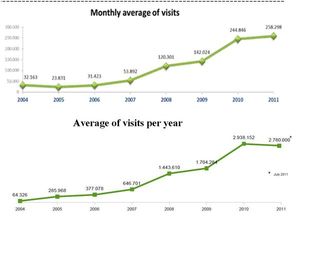Posted by Jorge Hage, Comptroller General of Brazil
In November 2004 the Brazilian Office of the Comptroller General created the Transparency Portal of the Federal Public Administration (http://www.transparencia.gov.br/) to provide free access to the federal budget data. The Portal can be accessed by anyone without the need of a username or password. This is intended to facilitate citizen oversight of the federal budget. The Portal is a webpage in which the budget execution of the federal government is disclosed using a user-friendly presentation with language less technical than used in the accounting system. The Portal is very comprehensive and provides information on all transfers to states, municipalities, and the Federal District; transfers to citizens benefiting from social programs; and direct spending of the federal government agencies through tender processes or direct contracts. Among others, it includes spending of each agency on per diem remuneration of staff, office supplies, equipment, projects and services; as well as spending through credit cards used by federal government officials.
Since the year 2000, and most notably since 2044, Brazil has adopted several legal and institutional reforms on fiscal transparency in line with best international practices. Some of the milestones have been the 2000 Fiscal Responsibility Law (FRL), the constant improvement of the federal government Integrated Financial Management Information System – SIAFI (Sistema Integrado de Administração Financeira) and the creation of Comprasnet, an electronic procurement and bidding system.The core objectives of the Fiscal Responsibility Law are not only prudent fiscal management, control, and oversight of public finances, but also fiscal transparency. In 2009, the FRL was amended (Complementary Law no. 131/2009) to extend the level of transparency on budget execution at all levels of government. According to this law the federal government, states, municipalities, and the Federal District have to give access through the Internet to detailed information on their budget execution.
Since its launch, the use of the Transparency Portal has increased continuously, as shown in the chart below. The Portal has also been constantly improved to provide a better service to Brazilians citizens. Since May 2010 data on budget execution and revenue collection of the central government is updated on a daily basis, thus every transaction completed every day is published and available for consultation on every following morning on the Portal.
The Transparency Portal also discloses information on transfers by the federal government to NGOs and private institutions and funds transferred through block grants to specific projects at the local level.
Current search queries within the Transparency Portal
Any citizen can search budget execution information according to the following categories: type of expenditure; type of transfer; type of revenue; and beneficiary of the expenditure. The table below illustrates the search queries that can be made.
Category | Queries |
Direct federal expenditure | Type of expenditure Ministry(i.e., executing organization) Government action(i.e., sub-program) ….Government organizations ….Non-profit organizations ….Individuals, companies and associations ….Legal persons by economic activity Travel and per diem Federal Government Payment Card by ….by organization ….card holder |
Transfer of resources | Transfer to states/municipalities Transfers by governmentaction Transfers to …. governmental organization …. not-for-profit organization …. legal persons per economical activity …. person …. other legal persons |
Revenues | Public organization Type of revenue |
Agreements (Convênios) | Transfers to ….State / Municipality ….public organization Transfers by …. week …. month |
Register of Debarred Enterprises (CEIS) | Name or Number of National Register of Legal Persons Type of sanction |
Public officials | By name or Number at the National Registry of Persons By positions and functions of trust and gratifications By Federal Public Body |
The Transparency Portal also includes special sections to provide information on public spending related to two important public events that Brazil will host in the near future: the FIFA World Cup 2014 and the Olympics Games 2016. As those events require large amounts of public investments in services and infrastructure, the Brazilian government has published information on each project since May 2010.
Data on budget execution, procurement, financing, contracts, construction schedules, responsibilities, licenses, among other important information about those events is available for every citizen in an easy to access way through the Portal. The information is organized by each host city and by different areas of interest such as arenas, airports, security, tourism, etc.
Both sections provide also information on related news, a glossary, legislation and useful links directly related to the subject. An online channel allows whistle-blowers and citizens to report problems they found in those projects to the Office of the Comptroller-General. The identity of the citizen is fully protected.
The World Cup section can be found at http://www.transparencia.gov.br/copa2014/ and the Olympic Games transparency section at http://www.portaldatransparencia.gov.br/rio2016/.
Government efforts to improve transparency and social control have led to a steady growth in the number of visits to the Brazilian Transparency Portal. However, this is not the only way to measure the Portal’s importance. An increasing number of references in the media using the website’s data have demonstrated the success of the initiative by providing easy access to government financial information and contributing to public awareness through a very efficient and accessible channel of information.








